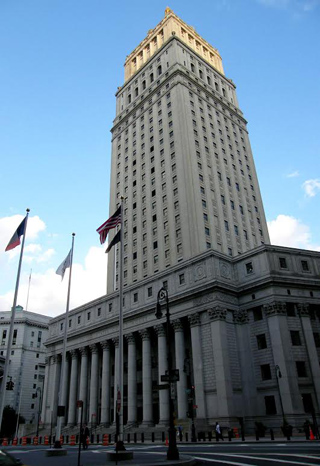
Recent lower court cases involving workers include:
Can a company discipline a worker for making a passing remark about a union organizing drive? ConAgra Foods says “yes,” in a case involving Jeannette Haines during a 2011-2012 organizing drive in Troy, Ohio. The National Labor Relations Board says “no.”
In a case before the 6th U.S. Circuit Court of Appeals in Cincinnati, Haines, a sanitation worker at ConAgra’s Slim Jim factory, casually asked two colleagues if they would re-sign union election authorization cards for UFCW Local 75 before a rerun election. When they said yes, she promised to leave them in a locker. That’s all she did. ConAgra disciplined her.
The NLRB said the discipline is illegal – and that ConAgra’s “no solicitation” policy is so broad that it’s illegal, too, because it bans workers from talking about the union even outside the bounds of company factories. The board wants the court to overturn both Haines’ discipline and ConAgra’s solicitation ban.
Nasty comments on a Facebook page are not equal to misconduct on a picket line. When Charles Weigand protested against nasty comments on a local union’s Facebook page about people who crossed picket lines, the NLRB’s general counsel agreed with him that the union broke labor law – but its administrative law judge, the board itself and the D.C. Circuit Court of Appeals didn’t.
Weigand was upset by the comments during Amalgamated Transit Union Local 1433’s six-day 2012 strike against a private bus operator, Veolia Transportation, in Phoenix. Unions must regulate conduct on picket lines, but Facebook is another matter.
The board’s “administrative law judge held ‘The Facebook page is in no way an electronic extension of the union’s picket line,'” a 3-judge D.C. Circuit panel ruled on April 17. Agreeing with the NLRB, the judges said Local 1433 “was not responsible for the Facebook comments because the individuals who posted the comments were neither alleged nor found to be agents of the union.” And a Facebook page, unlike a picket line, is private, they added.
Yet another union loses another try at pinning securities fraud on a bank that misled investors before the Great Recession. In this case, it was the International Brotherhood of Electrical Workers (IBEW), one of a large class of investors that sued the Royal Bank of Scotland for misleading statements and outright fraud about its subprime mortgage holdings before the crash. The investors bought RBS shares and when the crash came, those shares crashed, too. The investors cited statements from the bank downplaying its holdings and not disclosing $20 billion in subprime mortgage losses. But the U.S. district court judge tossed out the class action case, and the 2nd U.S. Circuit Court of Appeals in Manhattan agreed.
The union and other investors “do not allege the amount of exposure could have been calculated precisely, masks a change in earnings, changes a loss into income or vice versa, or involves an unlawful transaction, or that the misstatements resulted in a significant positive market reaction…Even if the qualitative factors weighed more heavily in favor of plaintiffs, we would still dismiss the misstatements for failure to plead fraud,” the appellate judges said.
New York’s home care providers wage law is legal. After the U.S. Supreme Court ruled several years ago that home health care workers are the equivalent of babysitters and thus do not even have to get paid the minimum wage, New York passed its own law setting a minimum wage and overtime pay for them. A group of home health care agencies sued the state, and lost in the 2nd U.S. Circuit Court of Appeals.
“The law as a whole is not preempted by the National Labor Relations Act, and does not violate plaintiffs’ (the home care firms’) rights under the equal protection and due process clauses of the 14th Amendment” to the U.S. Constitution, the judges ruled on March 27.
You’ve got to make “every reasonable effort” to settle a strike before gaining a court order against it. That’s what the 9th U.S. Circuit Court of Appeals ruled when Teamsters Local 117 at Sea-Tac International Airport in Washington state challenged the lower court’s injunction against its 2012 strike. The Aircraft Service International Group didn’t try to settle, and didn’t deserve the injunction, the appeals court ruled, 2-1, in March.
“The Norris-LaGuardia Act strips district courts of jurisdiction to enter such an injunction unless the party seeking relief has made ‘every reasonable effort to settle such dispute either by negotiation or with the aid of any available governmental machinery of mediation or voluntary arbitration,'” Appellate Judge John Owens wrote. “Because the district court failed to consider whether ASIG satisfied this provision and the record lacks any evidence that ASIG did so, we reverse and vacate” – toss – “the preliminary injunction” against the union.
If you sponsor an initiative in California, you can’t hide. That’s what 9th Circuit Judge Stephen Reinhardt ruled on April 3 for the entire court. California and the city of Chula Vista took several corporations to court over a local ballot measure. The state and the city both require an “official proponent” of an initiative be “an elector” of the jurisdiction and that the proponent’s name appear on the ballot petitions. The lower courts sided with the state and the city against the so-called “Chula Vista Citizens.” So did the appeals court.
“The requirement that the official proponent of a ballot measure be an elector, thereby disqualifying corporations and associations from holding that position” does not violate the 1st Amendment’s freedom of speech and association, the judges stated.
Photo: Thurgood Marshall U.S. Courthouse, home of the United States Court of Appeals for the Second Circuit, New York City’s Foley Square. | Wikimedia (CC)

MOST POPULAR TODAY


Zionist organizations leading campaign to stop ceasefire resolutions in D.C. area

High Court essentially bans demonstrations, freedom of assembly in Deep South

Afghanistan’s socialist years: The promising future killed off by U.S. imperialism

Communist Karol Cariola elected president of Chile’s legislature






Comments